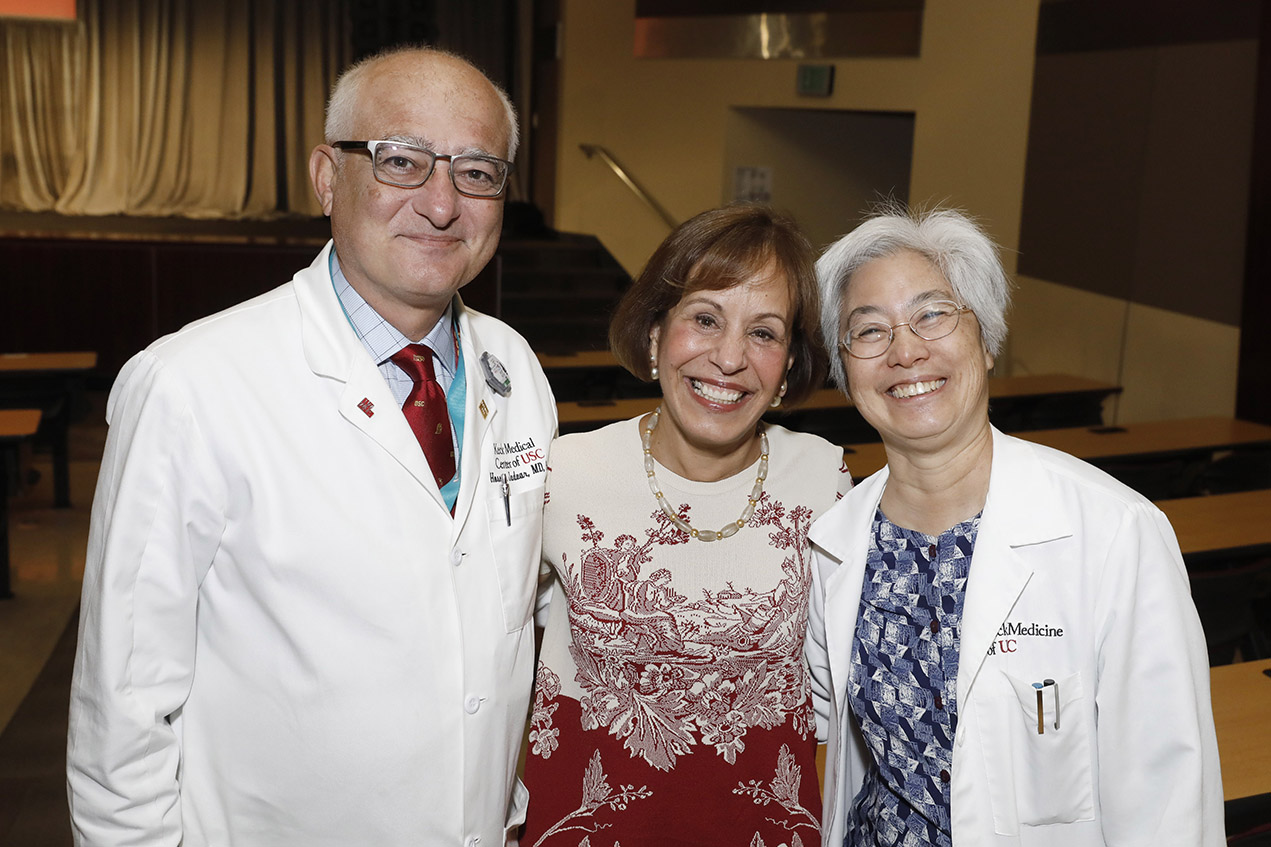The Health Sciences Campus community recently presented some of its best and brightest faculty members as part of the array of events celebrating the inauguration of the university’s 12th president. Carol L. Folt, PhD, took the helm at USC in July, but will be formally installed in office on Sept. 20.
The HSC Faculty Symposium, held Sept. 18 at Mayer Auditorium, brought together seven faculty members from the Keck School of Medicine of USC, USC School of Pharmacy, USC Rossier School of Education, USC Viterbi School of Engineering and the USC Chan Division of Occupational Science and Occupational Therapy, to showcase their innovative and multidisciplinary fields of study in TED-style talks. A second symposium was scheduled to be held Sept. 19 on the University Park Campus.
“It is always wonderful to remember that just right next door, or in the lab, the building across the street, or over on the other campus, there is somebody doing something amazing that you would like to know about,” Folt said. “In a great university, what we have to do is make it possible for you to keep training the next generation and make a difference in the world.”
Sook-Lei Liew, PhD, OTR/L, assistant professor of occupational science and occupational therapy at USC Chan with joint appointments in the USC Division of Biokinesiology and Physical Therapy, the Keck School and USC Viterbi; director of the Neural Plasticity and Neurorehabilitation Laboratory; and member of the USC Stevens Neuroimaging and Informatics Institute, discussed how Tinder and the latest developments in virtual reality are inspiring and influencing the latest stroke research projects in a talk titled, “Innovation through Collaboration for Stroke Rehabilitation.”
Erin Trish, PhD, assistant professor in the Department of Pharmaceutical and Health Economics at the USC School of Pharmacy and associate director at the USC Schaeffer Center for Health Policy and Economics, led a talk titled, “Protecting Patients from Surprise Medical Bills” that introduced the intricacies of insurance plans and the public policies that dictate the way those plans are allowed to charge patients.
David Armstrong, DPM, PhD, professor of clinical surgery at the Keck School and director of the Southwestern Academic Limb Salvage Alliance, kept the audience entertained while also explaining the ways wearable technology and smart textiles already are helping diabetic patients during a talk titled, “Eliminating Amputations in People with Diabetes: A Merger of Next-Gen Team, Technology and Tenacity.”
Julie Posselt, PhD, associate professor of higher education at the USC Rossier School and project lead for the California Consortium for Inclusive Doctoral Education, spent time explaining to the audience how identifying talent in higher education can reflect bias, and posed the question, “How can we admit, hire, promote, and otherwise evaluate the next generation with greater purpose and equity?”
Lilyana Amezcua, MD, associate professor of clinical neurology at the Keck School, MS Fellowship Program director and MS Comprehensive Care and Research Group, discussed how she is expanding her research into multiple sclerosis during a talk titled, “Genetic Ancestry, Acculturation and Disability in Hispanics with Multiple Sclerosis.”
Stacey Finley, PhD, Gordon S. Marshall Early Career Chair and associate professor of biomedical engineering, chemical engineering and materials science, and biological sciences at USC Viterbi, led a talk titled, “Mathematical Oncology: Modeling and Simulations to Truly Understand Cancer and Develop Better Treatment Strategies.”
Beth Pyatak, PhD, OTR/L, associate professor at USC Chan, shared how her research in lifestyle redesign occupational therapy interventions for type 1 and type 2 diabetes patients became very personal, as well as how she has been integrating wearable technology to examine the short-term dynamic relationships between blood sugar, function and emotional well-being in the daily lives of people with diabetes.



